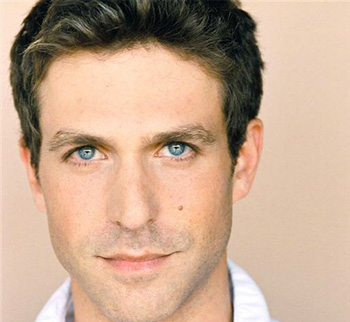In the summer of 2012, David Julian Hirsh found his calling as a rabbi, and reached a congregation of around 750,000 Americans a week. A year later, he traded that job for a cantor’s robes and got an even bigger audience. In November 2014, Hirsh found the biggest reception of his career – as a rabbi again – yet did so in front of a whopping five million people.
What is Hirsh’s trick to getting a large, faithful following? Play a Jewish spiritual leader on television.
Hirsh, a Montreal native, has found his niche playing roles that connect him to his Jewish roots. He played a rabbi in both the final season of Showtime’s drug comedy Weeds and a recent episode of the NBC thriller Grimm.
Meanwhile, his acclaimed performance as an Orthodox cantor in the Lifetime movie Twist of Faith earned Hirsh a Canadian Screen Award nomination this year.
“I didn’t think that I’d be able to merge the two in any way,” he says, referring to his religion and his acting.
“When I started doing theatre, I was working with the Jewish [Repertory] Theater of New York and I was lucky enough to work on these roles that had spiritual elements. In Hollywood, [I thought] you’re not going to find that anywhere.”
For his portrayal of Rabbi David Bloom on Weeds, Hirsh tried to adopt his grandfather’s Polish accent. The voice did not thrill series creator Jenji Kohan, he tells The CJN. However, Kohan had wanted to be a rabbi and tried to offer some of her own thoughts about faith into the series through that character.
“She was wrestling with some interesting themes… that she was able to write in for the rabbi that I think a lot of us wrestle with,” Hirsh says. “To be able to touch any of that in Hollywood is a great thing.”
Originally, Hirsh only meant to get into acting as a hobby before law school, but says he fell in love with the craft during a summer program in New York City. He aspired to work mainly in theatre, but eventually made his way to Los Angeles to audition for “pilot season.”
Despite his newfound specialty for tackling religious roles, Hirsh is still looking for parts. Now living in Los Angeles, Hirsh says he takes acting classes every week and runs out to auditions at least once a day. Lead roles on short-lived Canadian comedy Naked Josh and the TNT medical drama Hawthorne helped to boost his resume, but screen work is not constant.
“Even if you’ve reached a high level of success… you’re still going for job interviews at the age of 40,” he says.
Regardless, the Jewish parts are his favourite ones, Hirsh says. Now that he has cornered the market for playing rabbis, he is working on developing a show for Canadian television. He says it is a historical drama centred on the Jewish mob in Montreal in the 1940s and 1950s.
Beyond recent jobs, Hirsh has been attached to various Jewish roles in his career. In 2006, he starred as the protagonist in the CBC/BBC adaptation of the Mordecai Richler novel, St. Urbain’s Horseman. On the New York stage years earlier, he played a rabbi’s son. Elliot Gould played the rabbi in that production. Years later, Hirsh recommended Gould for a small part in Horseman.
For Twist of Faith, Hirsh played Jacob Fisher, a Brooklyn cantor mourning the loss of his family. He eventually finds a sort of salvation in a small Alabama town, where he befriends Nina, a church choir leader played by R&B singer Toni Braxton.
The role of a Jewish man falling in love with a black Christian woman could have courted a lot of controversy, but the inter-faith themes resonated with audiences. The part also called on Hirsh to sing next to Braxton, which is no easy feat.
Hirsh says that Twist of Faith was the most meaningful performance of his career. To prepare for the part of a man going through mourning, Hirsh thought of his grandparents, Holocaust survivors who lost much of their family in the war.
“This [film] was one of the first times I felt at peace,” Hirsh says. “I felt fulfilled as an actor and as myself. It was all connected. I hope and pray I get more roles like that.”
“The study of acting is the study of life. So when whatever’s happening in my life is happening in my work, it’s kind of nice.
